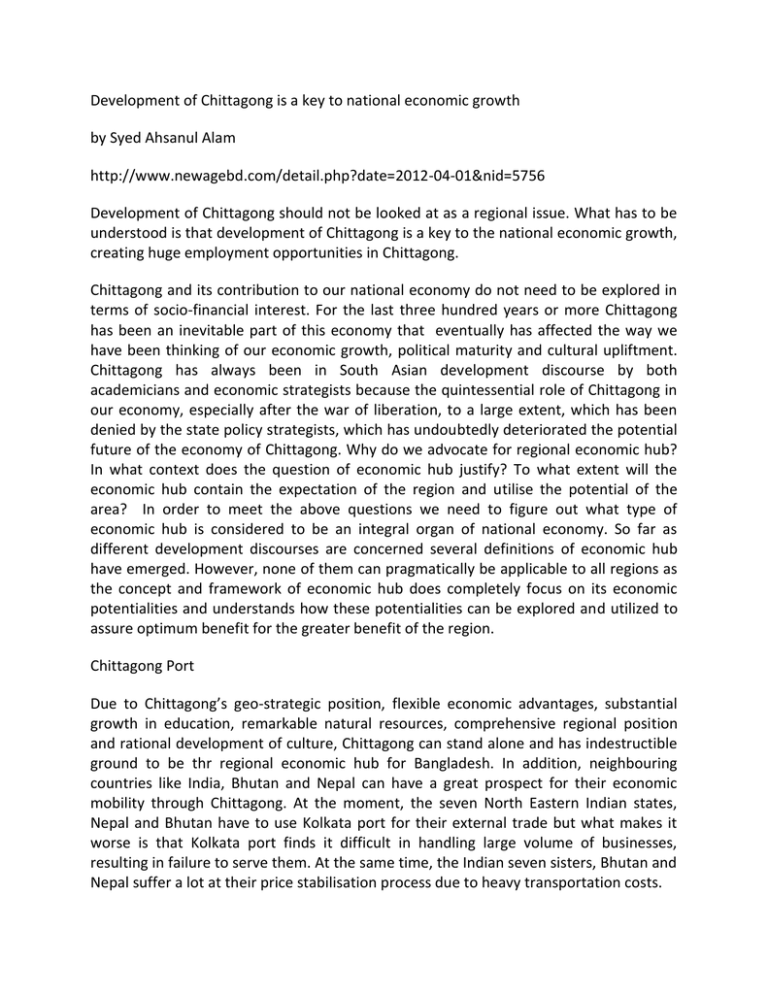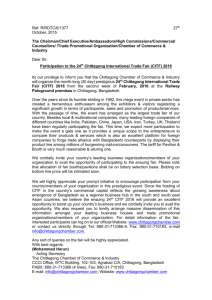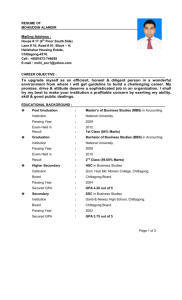Document
advertisement

Development of Chittagong is a key to national economic growth by Syed Ahsanul Alam http://www.newagebd.com/detail.php?date=2012-04-01&nid=5756 Development of Chittagong should not be looked at as a regional issue. What has to be understood is that development of Chittagong is a key to the national economic growth, creating huge employment opportunities in Chittagong. Chittagong and its contribution to our national economy do not need to be explored in terms of socio-financial interest. For the last three hundred years or more Chittagong has been an inevitable part of this economy that eventually has affected the way we have been thinking of our economic growth, political maturity and cultural upliftment. Chittagong has always been in South Asian development discourse by both academicians and economic strategists because the quintessential role of Chittagong in our economy, especially after the war of liberation, to a large extent, which has been denied by the state policy strategists, which has undoubtedly deteriorated the potential future of the economy of Chittagong. Why do we advocate for regional economic hub? In what context does the question of economic hub justify? To what extent will the economic hub contain the expectation of the region and utilise the potential of the area? In order to meet the above questions we need to figure out what type of economic hub is considered to be an integral organ of national economy. So far as different development discourses are concerned several definitions of economic hub have emerged. However, none of them can pragmatically be applicable to all regions as the concept and framework of economic hub does completely focus on its economic potentialities and understands how these potentialities can be explored and utilized to assure optimum benefit for the greater benefit of the region. Chittagong Port Due to Chittagong’s geo-strategic position, flexible economic advantages, substantial growth in education, remarkable natural resources, comprehensive regional position and rational development of culture, Chittagong can stand alone and has indestructible ground to be thr regional economic hub for Bangladesh. In addition, neighbouring countries like India, Bhutan and Nepal can have a great prospect for their economic mobility through Chittagong. At the moment, the seven North Eastern Indian states, Nepal and Bhutan have to use Kolkata port for their external trade but what makes it worse is that Kolkata port finds it difficult in handling large volume of businesses, resulting in failure to serve them. At the same time, the Indian seven sisters, Bhutan and Nepal suffer a lot at their price stabilisation process due to heavy transportation costs. According to economic and development experts, the unique geographical location of Bangladesh can easily take more responsibility to meet the demand of external and internal users. Chittagong sea port is one of the largest and deepest natural ports in the world, having huge natural capabilities of undertaking more responsibility not only to meet the domestic demand but also take on external demand. According to present strength, Chittagong Port can handle 35 million tons of cargos and about 12 millions of containers, but what is awful to note is that Chittagong port can be equipped to handle more and more cargoes because of its geographical settings. Consequently, the capacity building of Chittagong Port should be in the forefront of the development strategies. About 85 per cent of the international trade of our country is run through the Chittagong Port. But when it comes to capacity building of Chittagong port the issue has been neglected. For the better performance of the port the things that can be addressed are: political stability, colonial bureaucracy and assurance of local integration. As a result, Chittagong Port has yet to be developed as it should be. Expansion of the port has to be prioritized by the concerned bodies as early as possible because we need greater presence of our port in our regional economy or our dreams shall remain as dreams if there is no political stability. Some reports indicate that there are several political and nonpolitical organisations, specially labor organisations, who are active in the port that often block and damage the normal functions of the port, sometimes, apparently, for no reasons they call strike and paralyse the day-to-day activities. Besides, colonial bureaucratic practices are also putting impediments to its growth. Corruption, non-cooperation and red-tapism characterise the practices in our port. To bring an end to them the port ought to be disinfected politically first, and then technologically improved. Best ICT practices need to be brought into consideration to expand its capacities, to redefine its image and to turn it into an exemplary organ of our business. Similarly, local interest should be taken into confidence by the stakeholders to enhance the employability of the port. Deep seaport It has been a remarkable experience that different large economies of the world, e.g. China, South Korea, Singapore earned huge economic growth by establishing deep sea ports. In comparison, the prospect of deep sea port for our economy is now a matter of our survival. The geographical advantage of Chittagong is, in many cases, better than other similar locations for setting up deep seaport. But what makes us worried and terribly uncertain are our state’s decisions with regard to initiating deep sea port in Chittagong because this kind of momentous task requires uniform national consensus where all political parties, irrespective of their position in the government, should come forward with comprehensive strategies to make it happen. It is reported in different newspapers that having the potential of being an economic hub of the country, Chittagong port’s capacity utilisation is not up to the mark. Chittagong port, handling more than 80 per cent external trade of the country, will have to be well placed to serve the sea-borne trade of Nepal, Bhutan, Southern China, Mayanmar and the Northeastern region of India to earn substantial foreign exchange revenue. China and India have already taken several bilateral projects with Myanmar in consideration of their pressing need, which indicates a bright prospect for setting up a deep sea port in Chittagong. Myanmar recently signed several separate agreements with China and India for economic co-operation including selling of its own port facilities to these two countries. Bangladesh has made much delay in giving an operational shape to its proposed deep seaport project whereas Myanmar has developed three ports, including Sittwe port in Rakhaine state just on east and southeast of Bangladesh. Recently developed and sufficiently modernized Sittwe port, situated some 200 kilometers southeast of Chittagong, is emerging as one of the key operational ports in the region. India has set up a road link with Sittwe Port to meet the needs of its eastern states. It is a freighting picture for Bangladesh if we make more delay in taking decision and execution. Ship-building industry Bangladesh can learn many things from South Korea, China, Sri Lanka, India and Vietnam about shipbuilding industry. These countries have successfully utilized there geographical settings to take maximum benefits from shipbuilding industry. It is true that Bangladesh can provide relatively cheaper labour because of our demographic advantages. Many western ship customers are now shifting their attention to different Southeast Asian countries to get their ships manufactured at low-cost. This is high time we had availed this opportunity. Here, Chittagong is an ideal place where our dream of manufacturing ships can hold more place due to its unique facilities. Tourism Bangladesh is one of the natural-beautiful-enriched countries in South Asia with its unique cultures. It does provide substantial unique tourism products of its own for tourists, not only for domestic travelers but for overseas tourists as well. Most of the focus of tourism business in Bangladesh is associated with its conventional products; however, it has also realised that Bangladesh has to go along with the counterparts to make the country viable for tourism industry. In this regard, Chittagong, as a home of sea and hill tracts, is quite an attractive location for sea and hill tourism. Surrounded by the rivers and hills and the sea, Chittagong possess the opportunity to uphold its image as a fascinating multiple tourism destination where the visitors or tourists will enjoy both the sea and hill. The largest unbroken sea beach in the world, located at Cox’s Bazaar in Chittagong, could be the tourist capital, presenting the position of the country in the global arena. Tourism as one of the fastest growing industries in the world, has been taken as a thrust sector in different countries like Malaysia, Singapore, India, Philippines and they are reaping the economic benefits. As we study the tourism experiences of the region, Bangladesh has to learn from the neighboring countries at the shortest possible time so as to reach a comprehensive and anonymous strategy comprising opinions of all stakeholders. Special Economic Zone Chittagong has already been a home to highest foreign direct investment in Bangladesh through four Export Processing Zones in Chittagong. Chittagong Export Processing Zone (CEPZ) is the largest special Economic Zone in Bangladesh. With the development of port and the establishment of deep seaport in the future Chittagong can open up more and more opportunities for setting up new special economic zones along the Bay of Bengal. It is thought that pragmatically, Chittagong is the best place in Bangladesh to attract more foreign investment because of its sea port. So, the growth strategies of Chittagong should be a multilateral one where development of one organ will depend on the growth of another organ. Capacity building of chambers and trade bodies On the other hand, to make Chittagong as an economic hub, capacity building of chambers of commerce and industries and other trade bodies has to be prioritized in terms of administrative flexibility and business orientation. At present, there are two chambers: Chittagong Chamber of Commerce & Industries and Chittagong Metropolitan Chamber of Commerce & Industries. Development of business, whether it is industry or not, is closely related with chambers as it is the professional body which work as a platform for the stakeholders to raise their voices in public house. So the private sectors should work together to strengthen the capacity of chambers so that they can play and take wider role in the development of business. BGMEA Chittagong chapter can also play a pivotal role in transforming the city into an economic hub in the true sense. Strengthening Chittagong Development Authority In addition, the role of Chittagong Development Authority (CDA) ought to be widened and administratively decentralized in zones. As it is a regional autonomous body for development, so, it needs to understand the contemporary need of the region in order that it can take time demanded initiatives of its own and extend cooperation with other related agencies. It has been a fallacy that Chittagong Development Authority was born to focus on Chittagong city which is an utter misconception. But what the CDA is for it should focus on the development of Chittagong. So, the ball of CDA should be played in even out of Chittagong city, i.e. ensuring adequate infrastructural facilities across the region. In this case, some of its measures can be shared and implemented as publicprivate partnership. At the same time, access to CDA by the stakeholders and citizens should be made as convenient as possible. Finally, the activities of CDA need to be driven to make Chittagong as an international city in all respects. Establishing more container terminals Though container handling system in Bangladesh got a thrust, but the expansion is being done without proper planning. Premeditated enhancement in logistics support is emerging gradually for further expansion and efficiency of the port. However, the haphazard growth of container terminal is somewhat jeopardizing the business prospects of this sectors as business entities are establishing container terminal wherever they manage spaces. Many container terminals have already been established around Patenga, Shitakundo and Barabkundo. But the situation may worsen further if the practice continues because it will create unbelievable traffic congestion for port users. In line with the expansion of Chittagong port and establishment of deep seaport the container terminal should be located in such a place which can be accessed to from different regions and near the potential specialized economic zones. As we consider large stretches of land along the Bay of Bengal are waiting to house new industries, so, container terminal may be facilitated on the Bay of Bengal. But this can be done only if other logistics facilities are made available for example, road, ICT and power. Welcoming ICT In order to transform Chittagong into a real economic hub all the efforts behind the dream cannot turn it into a reality unless there is a strong presence of ICT facilities in Chittagong. Policymakers and strategists so often articulate that the development of Bangladesh largely depends on adequate development of ICT. Present day business, both domestic and international, cannot be dreamt of without having complete access to ICT. Prime ministers’ Digital Bangladesh declaration is a reflection of the importance of ICT. More and more ICT providers and investors are warmly welcome to Chittagong. Conclusion Development of Chittagong should not be looked at as a regional issue. What has to be understood is that development of Chittagong is a key to the national economic growth, creating huge employment opportunities in Chittagong as an economic hub that will open up substantial benefits for the nation. But the experience of ours seems to be very gloomy for the fact that the state mechanism has not exhibited enough pragmatic support for Chittagong. If we look back at the history, it is awfully observed that Chittagong has to always struggle a lot to make the central political decision-makers understand that Chittagong has enormous potential that may lead the country to a position of highest achievement. Furthermore, all the stakeholders who dream of Chittagong as an economic hub should reach a uniform platform irrespective of their socio-political differences. ____________________________________________________________ Syed Ahsanul Alam is Professor & Chair, Marketing Studies & International Marketing, Chittagong University and Director, Rupali Bank Limited and Chittagong Metropolitan Chamber of Commerce & Industries.



